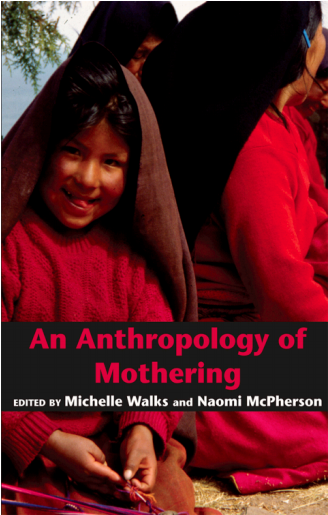
Price: $34.95
Page Count: 314
Publication Date: December 2011
ISBN: 978-0-9866671-8-3
Preface
Michelle Walks & Naomi McPherson
Introduction: Identifying an Anthropology of Mothering
-Michelle Walks
Awkward Engagements in Mothering: Embodying and Experimenting in Northwest China
- Kelly Dombroski
FROM WHOM WE CAME – KNOWING OUR FOREMOTHERS
An Evolutionary Motherline: Great Ape Mothers and Hominin Foremothers
- Pat Miller-Schroeder
Burning the Apron Strings: How 21st Century Women Conceptualize Mothering in Comparison to That of Their Own Mothers
– Maya Bhave
Making Mothers: Birth and the Changing Relationships of Mothering in Pango Village, Vanuatu
-Alexandra Widmer
Flows of Language: Intergenerational Connections and Language Transmission among dän k’è (Southern Tutchone) speakers
- Jenanne Ferguson
MOTHERING & HEALTH
Reconceptualising Mothering: Mothers and Infants in Crisis in the Kimberley, Western Australia
- Gaynor Macdonald & T. John Boulton
Medicalized Motherhood: Biomedical and Qur’anic Knowledge Informing Childrearing Practices
- Elizabeth M. Urbanowski
Breastfeeding and the “good mother” ideal in São Paulo, Brazil
- Alanna Rudzik
Breastfeeding, Subjugation, and Empowerment in Rural Guatemala
– Anita Chary, Shom Dasgupta, Sarah Messmer, & Peter Rohloff
AGENCY & EMPOWERED MOTHERING
An Andean Paradigm or Mothering
- Mary Louise Stone
Cape Verdean Student Migrant Mothering and the Pendulum of Power
– Elizabeth Challinor
“The Ascetics of the Home”: Women and the Spiritual (Re)production of Maronite Lebanese Identity in Australia
– Nelia Hyndman-Rizk
Mothering as Ideology and Practice: The Experiences of Mothers of Children with Autism Spectrum Disorder
- Shubhangi Vaidya
Becoming a ‘Single-Mom’: Featuring Motherhood Over Marital Status Among Malays in Muslim Malaysia
– Audrey Mouser Elegbede
MOTHERING IN THE SHADOWS
Navigating the Tricky Waters of Maternal Militarization: Experiences of Being a Soldier’s Mother in Turkey
- Senem Kaptan
Mothering Woes: ‘Mothering’ and the Mother-Au Pair Relationship
-Anna Kuroczycka Schultes
Mothers in the borderland: child adoption in Misiones province, Argentina
- Moníca Tarducci (translated by: Sabrina Yañez)
Mothering in the Shadow of the United States Correctional System
- Susan Sered & Maureen Norton-Hawk
Afterword
-Naomi McPherson
Author & Editor Bios
Index
Michelle Walks, a PhD student at the University of British Columbia Okanagan, is passionate about queer issues, reproductive health, mothering, and feminist anthropology. Her work has been published in the Journal of the Association for Research on Mothering (now the Journal of the Motherhood Initiative), and Canadian Woman Studies.
Naomi McPherson is an Associate Professor of Anthropol- ogy at the University of British Columbia Okanagan, in Kelow- na., BC. Naomi is an established scholar, with extensive field- work experience in New Britain (Papua New Guinea), the author of In Colonial New Guinea: Anthropological Perspec- tives, and is also the new Editor-in-Chief of Anthropologica


